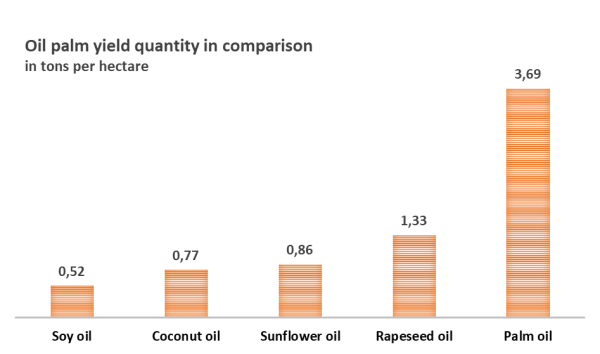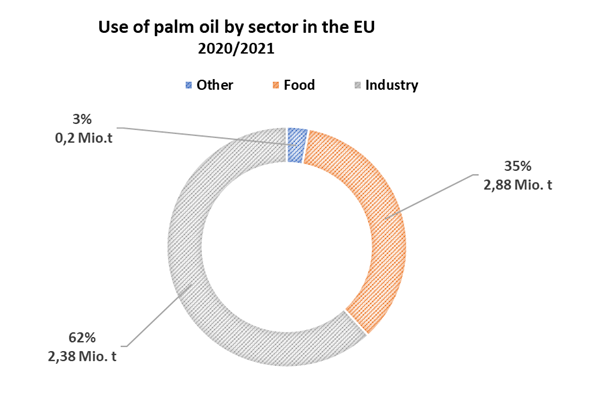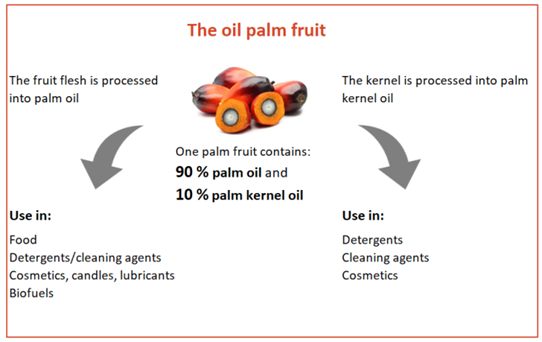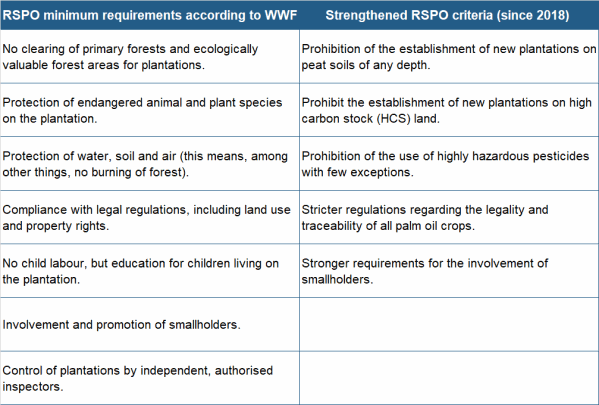RSPO certification offers an opportunity to improve the situation in the growing countries and to ensure the sustainability of the supply chain. Since January 2022, Donauchem has been RSPO certified and offers customers RSPO-certified products as a sustainable alternative to mineral oil or conventional palm oil products. Here is an overview of the most important facts about oil palm products, RSPO certification and Donauchem products.
The fruit of the oil palm: ideal raw material for industry
The oil palm is an extremely efficient crop plant and its fruit is one of the most sought-after raw materials in industry worldwide. The reasons for this are mainly the high yield per hectare, the low costs and the constant availability of the product on the world market.
- Year-round: Oil palms produce fruit all year round, are robust and less susceptible to pests.
- Versatile: Palm oils have a fatty acid composition and antioxidants that are beneficial for many applications.
- High yield: Compared to all other oil plants, oil palms provide the highest yield per hectare. For example, 3.69 tonnes of palm oil can be produced on one hectare, compared to only 0.7 tonnes of coconut oil or 0.86 tonnes of sunflower oil.
- Favourable: In terms of land consumption, the oil palm is the most economical oil plant. This makes palm oil the cheapest vegetable oil worldwide.

Palm oil and palm kernel oil for many applications
Palm kernel oil is not to be confused with palm oil. While palm oil is obtained from the pulp of the oil palm, palm kernel oil is a product of the kernels of the oil fruit. An oil palm fruit contains about 90 % palm oil and 10 % palm kernel oil.
In the meantime, over 75 million tonnes of palm oil and over eight million tonnes of palm kernel oil are produced annually worldwide. The world leader is Indonesia with a market share of 57%, followed by Malaysia with about 30% market share.
1. Palm oil
Palm oil has a smooth, firm consistency at room temperature and therefore does not need to be chemically hardened. It is also odourless and colourless, tasteless, heat-resistant and has a very long shelf life. These beneficial properties make palm oil a versatile product used in a range of products worldwide (IISD, 2020):
- Food: 72 % of total production is used in food products ranging from margarine, chocolate and biscuits to bread and ready-to-eat products such as pizza and instant soups.
- Industrial applications: 18 % of the volume produced worldwide is used in industrial applications and consumer products such as detergents and cleaning agents, cosmetics, candles and industrial lubricants.
- Bioenergy: 10 % is used to produce biofuels for transport, electricity or heat.
While the food sector dominates globally, 62 % of palm oil in the EU is used for energy production. Of this, about 50 % is used in the production of biodiesel, the rest goes to power plants for electricity and heat generation.
However, under the Renewable Energy Directive RED III, the use of palm oil-based fuels is to be phased out by 2030. Palm oil is considered by the EU to be a cause of excessive deforestation of rainforests. Palm oil imports into the EU are therefore expected to decline to 4.0 million tonnes by 2031, with most of the decline being due to falling demand for palm oil for biodiesel production.

2. Palm kernel oil
Palm kernel oil belongs chemically to the lauric oils. It contains more than 80 % lauric acid and other saturated fatty acids such as palmitic acid and stearic acid. The chemical structure of palm kernel oil thus corresponds to that of petrochemicals used for the production of surfactants. Palm kernel oil and its derivatives are therefore mainly used as surfactants in cosmetics and detergents and cleaning agents.

Why certification for oil palm products is becoming increasingly important
In recent years, the demand for palm (kernel) oil has risen continuously. The global cultivation area now covers about 19 million hectares. However, as global demand increases, so do the associated ecological and social problems:
- Deforestation: Numerous hectares of rainforest continue to be cleared in the cultivating countries for new plantations, destroying the habitat of local people and animals.
- Working conditions: In addition to the forcible resettlement of local people, there is repeated exploitation of labour, including forced and child labour.
- Pesticides: The use of pesticides and fertilisers is not subject to any control.
In the two most important producer countries, Indonesia and Malaysia, around 4.5 million people are employed on oil palm plantations. A reduction in the area under cultivation would mean the loss of their source of income for many families. Therefore, no longer cultivating palm oil is not a solution to all problems; on the contrary, it would create other problems.
Certified sustainable cultivation, on the other hand, offers the possibility of maintaining these urgently needed jobs, while at the same time limiting deforestation and promoting more environmentally friendly cultivation and fair working conditions.
The RSPO Certificate: Requirements & Criteria
RSPO is the abbreviation of "Round Table on Sustainable Palm Oil" and means "Round Table on Sustainable Palm Oil". The organisation, which has over 4,000 members worldwide, was founded in 2004 on the initiative of the WWF and aims to establish principles and criteria for making palm oil cultivation more sustainable.
In terms of product quality, there are no differences between certified and non-certified oil palm products. The RSPO certificate is not an eco-label, but a seal of quality. It confirms that the RSPO criteria have been met and that the products supplied come from sustainably managed palm plantations. 14.5 million tonnes of palm oil per year are already certified according to the RSPO. This corresponds to about 19% of global production.

RSPO certification of Donauchem
Growing consumer awareness of the problems of conventional palm oil cultivation has created a bad image for the oil palm in recent years. This developed into a desire for substitution and led to the popularity of a "palm oil free" label in some European countries.
Critically, this is not the right way to go: oil palm products are incredibly versatile raw materials with outstanding technical, functional and sensory properties. Global acreage is limited, while at the same time oil palm is many times more productive than all other oil plants. Substitution by other vegetable oils would only shift the production problems to other areas.
Thus, there is no way around the oil palm to meet the global demand for vegetable oil with the least possible use of resources. Consequently, the solution to the problems surrounding cultivation cannot lie in "palm-free" products. The better alternative is sustainably produced palm (kernel) oil. Therefore, Donauchem has joined the RSPO initiative and included sustainable alternatives to conventional oil palm products in its product portfolio.
Since January 2022, Donauchem GmbH has held an RSPO certificate and is thus taking another important, proactive step towards sustainability. After the successful RSPO initial audit, Donauchem's compliance with the strict regulations is ensured by an annual external monitoring audit.
Here, the complete documentation and balanced balance of the RSPO-certified products is checked. Through continuous monitoring and a check of the suppliers at every incoming goods inspection - they must have a valid RSPO certificate throughout - Donauchem ensures that the annual monitoring audits are also passed successfully.
Conclusion: RSPO certification
Real change in the palm oil industry can only take place if all links in the value chain participate. With RSPO certification, an effective instrument has been created to steer development steadily in a positive direction and to continuously improve the situation on the ground. As a member of the RSPO, Donauchem promotes this initiative and the associated change as part of its sustainability strategy. This ultimately benefits everyone - people, nature and the environment.
 www.donauchem.at
www.donauchem.at